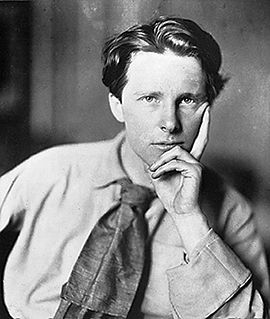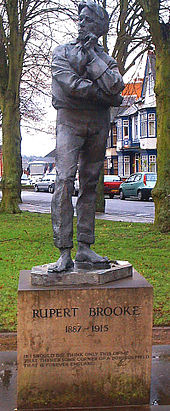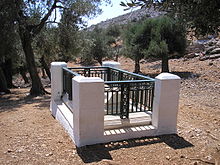- Rupert Brooke
-
Rupert Brooke 
Born 3 August 1887
Rugby, Warwickshire, EnglandDied 23 April 1915 (aged 27)
Aegean Sea, off the island of SkyrosCause of death Sepsis Resting place Skyros, Greece Nationality English Education Rugby School, King's College, University of Cambridge (fellow) Occupation Poet Employer Sidgwick and Jackson (Publisher) Known for Poetry Rupert Chawner Brooke (middle name sometimes given as Chaucer[1]) (3 August 1887 – 23 April 1915[2]) was an English poet known for his idealistic war sonnets written during the First World War, especially The Soldier. He was also known for his boyish good looks, which prompted the Irish poet William Butler Yeats to describe him as "the handsomest young man in England".[citation needed]
Contents
Early life and education
Brooke was born at 5 Hillmorton Road in Rugby, Warwickshire,[3] the second of the three sons of William Parker Brooke, a Rugby schoolmaster, and Ruth Mary Brooke, née Cotterill. He was educated at two independent schools in the market town of Rugby, Warwickshire; Hillbrow School and Rugby School.
While travelling in Europe he prepared a thesis entitled John Webster and the Elizabethan Drama, which won him a scholarship to King's College, Cambridge, where he became a member of the Cambridge Apostles, helped found the Marlowe Society drama club and acted in plays including the Cambridge Greek Play.
Life and career
Brooke made friends among the Bloomsbury group of writers, some of whom admired his talent while others were more impressed by his good looks. Virginia Woolf boasted to Vita Sackville-West of once going skinny-dipping with Brooke in a moonlit pool when they were at Cambridge together.[4]
Brooke belonged to another literary group known as the Georgian Poets and was one of the most important of the Dymock poets, associated with the Gloucestershire village of Dymock where he spent some time before the war. He also lived in the Old Vicarage, Grantchester.
Brooke suffered a severe emotional crisis in 1912, caused by sexual confusion and jealousy, resulting in the breakdown of his long relationship with Ka Cox (Katherine Laird Cox).[5] Brooke's paranoia that Lytton Strachey had schemed to destroy his relationship with Cox by encouraging her to see Henry Lamb precipitated his break with his Bloomsbury Group friends and played a part in his nervous collapse and subsequent rehabilitation trips to Germany.[6]
As part of his recuperation, Brooke toured the United States and Canada to write travel diaries for the Westminster Gazette. He took the long way home, sailing across the Pacific and staying some months in the South Seas. Much later it was revealed that he may have fathered a daughter with a Tahitian woman named Taatamata with whom he seems to have enjoyed his most complete emotional relationship.[7] Brooke fell heavily in love several times with both men and women, although his bisexuality was edited out of his life by his first literary executor. Many more people were in love with him.[8] Brooke was romantically involved with the actress Cathleen Nesbitt and was once engaged to Noel Olivier, whom he met while she was a 15-year-old at the progressive Bedales School.
Brooke was an inspiration to poet John Gillespie Magee, Jr., author of the poem "High Flight". Magee idolised Brooke and wrote a poem about him ("Sonnet to Rupert Brooke"). Magee also won the same poetry prize at Rugby School that Brooke had won 34 years previously.
As a war poet came Brooke to public attention when The Times Literary Supplement quoted two of his five sonnets (IV: The Dead and V: The Soldier) in full on 11 March 1915 and subsequently his sonnet V: The Soldier was read from the pulpit of St.Paul's on Easter Sunday. Brooke's most famous collection of poetry containing all five sonnets, 1914 & Other Poems, was first published in May 1915, and in testament to his popularity ran through 11 further impressions that year, and by June 1918 had reached its 24th impression;[9] a process undoubtedly fuelled through posthumous interest.
Corner of a Foreign Field
Brooke's accomplished poetry gained many enthusiasts and followers and he was taken up by Edward Marsh who brought him to the attention of Winston Churchill, then First Lord of the Admiralty. He was commissioned into the Royal Naval Volunteer Reserve as a temporary Sub-Lieutenant[10] shortly after his 27th birthday and took part in the Royal Naval Division's Antwerp expedition in October 1914. He sailed with the British Mediterranean Expeditionary Force on 28 February 1915 but developed sepsis from an infected mosquito bite. He died at 4:46 pm on 23 April 1915 in a French hospital ship moored in a bay off the island of Skyros in the Aegean on his way to the landing at Gallipoli. As the expeditionary force had orders to depart immediately, he was buried at 11 pm in an olive grove on Skyros, Greece.[1][2][11] The site was chosen by his close friend, William Denis Browne, who wrote of Brooke's death:[12]
...I sat with Rupert. At 4 o’clock he became weaker, and at 4.46 he died, with the sun shining all round his cabin, and the cool sea-breeze blowing through the door and the shaded windows. No one could have wished for a quieter or a calmer end than in that lovely bay, shielded by the mountains and fragrant with sage and thyme.His grave remains there today.[13] Another friend—and war poet—Patrick Shaw-Stewart, also played a prominent role in Brooke's funeral.[14] On 11 November 1985, Brooke was among 16 First World War poets commemorated on a slate monument unveiled in Poets' Corner in Westminster Abbey.[15] The inscription on the stone was written by a fellow war poet, Wilfred Owen. It reads: "My subject is War, and the pity of War. The Poetry is in the pity."[16]
Brooke's brother, 2nd Lt. William Alfred Cotterill Brooke, was a member of the 8th Battalion London Regiment (Post Office Rifles) and was killed in action near Le Rutoire Farm on 14 June 1915 aged 24. He is buried in Fosse 7 Military Cemetery (Quality Street), Mazingarbe, Pas de Calais, France. He had only joined the battalion on 25 May.[17]
In popular culture
- This Side of Paradise, by F. Scott Fitzgerald, opens with the quotation "Well this side of Paradise!… There's little comfort in the wise. — Rupert Brooke"[18]
- The title of An Unofficial Rose by Iris Murdoch, is taken from Brooke's The Old Vicarage , Granchester.
- Travel writer Richard Halliburton (1900-1939) gathered material, including an interview with Brooke's mother, for an eventual biography of Brooke, but completion of the task fell to Arthur Springer whose Red Wine of Youth--A Life of Rupert Brooke, benefitting from Halliburton's researches, appeared in 1952. According to Gerry Max, Horizon Chasers--The Lives and Adventures of Richard Halliburton and Paul Mooney, Halliburton's message to seek one's destiny abroad, and to embrace romantic enterprises, drew its chief inspiration, as did the new cult of youth emerging after World War I, from poet Rupert Brooke. "He died in a foreign land, young and full of promise; his life was the stuff from which beautiful dreams are made." Max notes that Brooke was himself a most accomplished travel writer, bringing to life, with an original cast of mind, all the places he visited, as his Letters From America fully demonstrates.
- Brooke's poem "A Channel Passage", with its vivid description of seasickness, is used for comic effect in a third-season episode, "Springtime", of the television series M*A*S*H. Corporal Radar O'Reilly reads the poem to a nurse he hopes to impress, with surprising results. Radar pronounces the poet's name as "Ruptured Brooke".
- Part of Brooke's poem "Dust" is used as the lyric for a song by the same title, composed by Danny Kirwan and recorded by Fleetwood Mac on their 1972 album Bare Trees. Brooke is not credited on the album.
- On Pink Floyd's war-themed album The Final Cut, the song "The Gunner's Dream" contains the lyrics "in the space between the heavens and the corner of some foreign field."
- Portions of Brooke's poem "The Hill" appear at the beginning of the video for the Pet Shop Boys song "Se a vida é (That's the way life is)".
- In the episode Major Star of the British sitcom Blackadder, Captain Blackadder parodies the poem "The Soldier", warning George 'If I should die, think only this of me, 'I'll be back to get you!'
- Brooke's poetry is used as character and plot device in the 1981 movie Making Love and the child ultimately born to the character Claire Elliott, played by Kate Jackson, is named after him.
- The 1997 mystery novel Dreaming of the Bones by Deborah Crombie contains numerous allusions to and quotations from Brooke.
- The 2009 novel The Great Lover, by Jill Dawson, is based on Brooke's life and mixes fact with fiction. The title is taken from one of Brooke's poems of the same name.[19]
References
- ^ a b "Royal Naval Division service record (extract)". The National Archives. http://www.nationalarchives.gov.uk/dol/popups/rndofficer1.htm. Retrieved 2007-11-11.
- ^ a b The date of Brooke's death and burial under the Julian calendar that applied in Greece at the time was 10 April. The Julian calendar was 13 days behind the Gregorian calendar.
- ^ "Poet Brooke's birthplace for sale". BBC News. 2007-08-21. http://news.bbc.co.uk/1/hi/england/coventry_warwickshire/6956623.stm. Retrieved 2008-08-08.
- ^ Vita Sackville-West letter to Harold Nicolson, 8 April 1941, reproduced in Nigel Nicolson (ed.), Harold Nicolson: The War Years 1939-1945, Vol. II of Diaries and Letters, Atheneum, New York, 1967, p. 159
- ^ Caesar, Adrian (2004). "‘Brooke, Rupert Chawner (1887–1915)’" (subscription required). Oxford Dictionary of National Biography. Oxford University Press. doi:10.1093/ref:odnb/32093. http://www.oxforddnb.com/view/article/32093?docPos=1. Retrieved 2008-01-12.
- ^ Keith Hale, ed. Friends and Apostles: The Correspondence of Rupert Brooke-James Strachey, 1905-1914.
- ^ Mike Read: Forever England (1997)
- ^ Biography at GLBTQ encyclopedia by Keith Hale, editor of Friends and Apostles: The Correspondence of Rupert Brooke-James Strachey, 1905-1914
- ^ '1914 & Other Poems' by Rupert Brooke, Sidgwick & Jackson, 1918 - 24th impression
- ^ London Gazette: no. 28906. p. 7396. 18 September 1914. Retrieved 2007-11-12.
- ^ "Royal Naval Division service record (extract)". The National Archives. http://www.nationalarchives.gov.uk/dol/popups/rndofficer2.htm. Retrieved 2007-11-11.
- ^ Blevins, Pamela (2000). "William Denis Browne (1888–1915)". Musicweb International. http://www.musicweb-international.com/classrev/2002/May02/WDBrown.htm. Retrieved 2007-11-09.
- ^ Casualty Details—Brooke, Rupert Chawner, Commonwealth War Graves Commission. Retrieved on 24 June 2010.
- ^ John Jones. "Patrick Houston Shaw-Stewart (1888-1917), War Poet". Balliol College Archives & Manuscripts. http://archives.balliol.ox.ac.uk/Past%20members/PHStewart.asp.
- ^ http://net.lib.byu.edu/english/wwi/poets/poets.html
- ^ http://net.lib.byu.edu/english/wwi/poets/Preface.html
- ^ RUPERT BROOKE at www.1914-18.co.uk
- ^ This Side of Paradise www.gutenberg.org from Brooke's poem Tiare Tahiti final line.
- ^ Dawson, Jill (2009). The Great Lover. Sceptre. ISBN 9780340935668.
Further reading
- Brooke, Rupert, Letters From America with a Preface by Henry James (London: Sidgwick & Jackson, Ltd, 1931; repr. 1947).
- Dawson, Jill, The Great Lover (London: Sceptre, 1990). A historical novel about Brooke and his relationship with a Tahitian woman, Taatamata, in 1913-14 and with Nell Golightly a maid where he was living.
- Halliburton, Richard, The Glorious Adventure (New York and Indianapolis: Bobbs-Merrill, 1927). Traveler/travel writer Halliburton, in recreating Odysseus' adventures, visits the grave of Brooke on the Greek island of Skyros.
- Keith Hale, ed. Friends and Apostles: The Correspondence of Rupert Brooke-James Strachey, 1905-1914.
- Gerry Max, Horizon Chasers - The Lives and Adventures of Richard Halliburton and Paul Mooney (McFarland, c2007). References are made to the poet throughout. Quoted, p. 11.
- Gerry Max, "'When Youth Kept Open House' - Richard Halliburton and Thomas Wolfe", North Carolina Literary Review, 1996, Issue Number 5. Two early 20th Century writers and their debt to the poet.
- Morley, Christopher, "Rupert Brooke" in Shandygaff - A number of most agreeable Inquirendoes upon Life & Letters, interspersed with Short Stories & Skits, the Whole Most Diverting to the Reader (New York: Garden City Publishing Company, 1918), pp. 58-71. An important early reminiscence and appraisal by famed essayist and novelist Morley.
- Arthur Springer. Red Wine of Youth—A Biography of Rupert Brooke (New York: Bobbs-Merrill, 1952). Partly based on extensive correspondence between American travel writer Richard Halliburton and the literary and salon figures who had known Brooke.
- Christopher Hassall. "Rupert Brooke: A Biography" (Faber and Faber 1964)
- Sir Geoffrey Keynes, ed. "The Letters of Rupert Brooke" (Faber and Faber 1968)
- Colin Wilson. "Poetry & Mysticism" (City Lights Books 1969). Contains a chapter about Rupert Brooke.
- John Lehmann. "Rupert Brooke: His Life and His Legend" (George Weidenfield and Nicolson Ltd 1980)
- Paul Delany. "The Neo-Pagans: Friendship and Love in the Rupert Brooke Circle" (Macmillan 1987)
- Mike Read. "Forever England: The Life of Rupert Brooke" (Mainstream Publishing Company Ltd 1997)
- Nigel Jones. "Rupert Brooke: Life, Death and Myth" (Metro Books,1999)
- Timothy Rogers. "Rupert Brooke: A Reappraisal and Selection" (Routledge, 1971)
- Christian Soleil. "Rupert Brooke: Sous un ciel anglais" (Edifree, France, 2009)
- Christian Soleil. "Rupert Brooke: L'Ange foudroyé" (Monpetitediteur, France, 2011)
External links
- Rupert Brooke Society
- Rupert Brooke on Skyros
- Works by Rupert Brooke at Project Gutenberg
- "Rupert Brooke's Grantchester" : the full text of the poem, plus a commentary and photographs by two local residents
- Poetry Archive: 150 poems of Rupert Brooke
- Bartleby.com - Collected Poems
- Rupert Brooke at the Commonwealth War Graves Commission database
- Elizabeth Whitcomb Houghton Collection, containing letters by Brooke
- 12 September 1915, New York Times, A Genius Whom the War Made and Killed; Rupert Brooke's Death at the Front Illustrates the Paradox of the Effect on Literature of War, Which Ended His Career and Made Him Immortal
- Lost Poets of the Great War, a hypertext document on the poetry of World War I by Harry Rusche, of the English Department, Emory University, Atlanta, Georgia. It contains a bibliography of related materials.
- Edward Winter, Rupert Brooke and Chess
- Dymock Poets Archive University of Gloucestershire Archives and Special Collections
Categories:- 1887 births
- 1915 deaths
- Alumni of King's College, Cambridge
- Bloomsbury Group
- British military personnel killed in World War I
- British World War I poets
- War writers
- Deaths from sepsis
- People of the Edwardian era
- English poets
- Infectious disease deaths in Greece
- LGBT people from England
- LGBT writers from the United Kingdom
- Old Rugbeians
- People from Rugby, Warwickshire
- Bisexual writers
- Sonneteers
- Royal Navy officers of World War I
- Skyros
- Royal Naval Volunteer Reserve personnel of World War I
- Fellows of King's College, Cambridge
Wikimedia Foundation. 2010.


